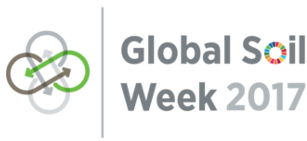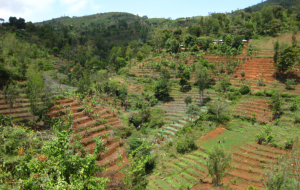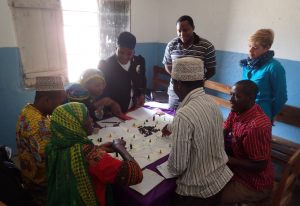Sustainable Land Management (SLM) techniques can be expensive; not only financially expensive, but labor intensive, too. Most farmers around to the world face some sort of resource constraint and must prioritize well-known techniques to manage their land and ultimately, choose to simply take care of it their own way, as best they can.
As sociologist Judith Rosendahl from the IASS Global Soil Forum explains, “The reasoning behind the farmers’ decisions is often not understood. Investments in sustainable land management have often failed in the past because they did not take account of the land users’ scope for cultivating their land.” Terraces, for example, are a favorite SLM technique that past development projects have promoted in Lushoto. Terraces reduce erosion and conserve moisture, yet establishing and maintaining them is extremely labor-intense. This technique is only beneficial if several neighbouring farmers come together and invest a significant amount of time and energy.
This is the reality for the farmers of north-east Tanzania and south-west Malawi involved in our AGORA project. Launched in 2014, AGORA worked to fight land degradation and investigate the political, social and economic constraints which hinder the adoption of sustainable land management techniques. Biophysical and socio-economic aspects of land degradation are addressed from a landscape perspective which acknowledges different scales of connectivity in a landscape, e.g. via resource flows, institutions, or social processes. The project was created with the goal of elaborating on more equitable solutions to land degradation by incorporating scientific knowledge from different disciplines, as well as first-hand knowledge from local people.
So, how can we work to assure poor farmers have equitable access to sustainable land management techniques?
Through a transdisciplinary multi-actor process meant to produce better-informed decisions, the Global Soil Forum and partner organizations worked to help improve the situation by facilitating dialogue among and between local researchers, decision-makers, non-governmental organizations, and land-users.
In Lushoto, Tanzania, it was discovered that although knowledge of sustainable land management issues and techniques were plentiful, support for their implementation was severely lacking. All stakeholders acknowledged a lack of coordination between the different land management actors and a desire to overcome this moving forward.
The solution was to form a stakeholder forum, complete with an elected management committee, and an action plan for better coordinated activities. The Umsambara Ecological Forum was officially registered under Tanzanian law. Their work has begun with the support of the district government, and in its most recent evaluation, participants expressed very high satisfaction with the transdisciplinary process that led to the establishment of the forum. They also hold high expectations for the forum to improve the land management situation. In Malawi, AGORA focused on testing and spreading awareness of specific sustainable land management techniques, which the farmers appreciated.
The AGORA project, in the end, helped to produce institutional change with the establishment of the Forum, and hopes to see lasting and better coordination of all actors to support more sustainable land management now and in the future.
You can read an in-depth review of the AGORA project from our partners at CIAT. Please also have a look at some photos from the project on our Flickr, and below.



